Do Big UK ISPs Really Plan to Block Website Forums and Swearing
The government’s controversial strategy for protecting children online by requiring the country’s largest broadband ISPs to introduce network-level filtering of adult websites (here) has come under fire again after some reports suggested that “Web Forums“, “Esoteric Content” and possibly even bad language might be on the censorship list. We attempted to find the truth.
As most people know the new filters will force all of BT, TalkTalk, Virgin Media and Sky Broadband’s customers (i.e. the bill payers) to make a choice about whether or not they opt-out of the new censorship measures (if you ignore / skip-though the choice when it’s presented then you’re opted-in by default).
After that customers whom have chosen to leave the filter enabled will be presented with a list of content categories that the filter will block. Each option on the list will come pre-ticked and, using the example of TalkTalks HomeSafe solution, the categories are expected to look broadly similar to this.
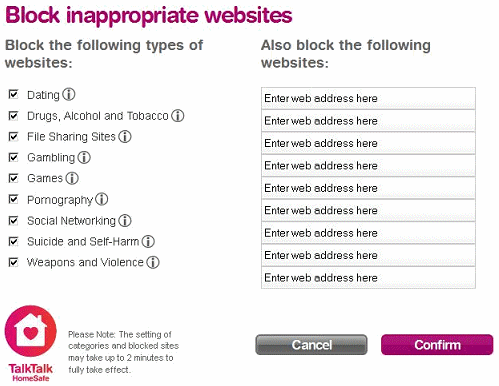
Like many people we have strong reservations about something like Social Networking being on such a list because this is an incredibly broad definition (i.e. you could in theory apply it to almost any website that allows visitors to interact with other people).
Admittedly some of the major social networks already claim to be for those aged 13+ or adults only. But in practice you’d have to be incredibly naïve to think that many younger children don’t already have an account. Blocking that wouldn’t go down well but at least it’s an option.. albeit a pre-ticked one.
What the heck is esoteric content!?
At the end of last month the Open Rights Group (ORG) warned that the United Kingdom could be “sleepwalk into censorship” by starting down a path towards default censorship and pre-ticking options that people could easily overlook and some of which may not even be “adult content” at all. On top of that most internet users have already become subconsciously use to automatically ignoring similar website pop-up windows.
Jim Killock, ORG’s Executive Director, said:
“What’s clear here is that David Cameron wants people to sleepwalk into censorship. We know that people stick with defaults: this is part of the idea behind ‘nudge theory’ and ‘choice architecture’ that is popular with Cameron.
The implication is that filtering is good, or at least harmless, for anyone, whether adult or child. Of course, this is not true; there’s not just the question of false positives for web users, but the affect on a network economy of excluding a proportion of a legitimate website’s audience.
There comes a point that it is simply better to place your sales through Amazon and ebay, and circulate your news and promotions exclusively through Facebook and Twitter, as you know none of these will ever be filtered.
Meanwhile ISPs face the unenviable customer relations threat of increased complaints as customers who hadn’t paid much attention find websites unexpectedly blocked.”
But the ORG also suggested that some ISPs might be planning to add two even broader categories to the above list, “Web Forums” and “Esoteric Material“; if that last one made you go “Eh!?” then you’re not alone because that’s the same reaction we got from all four of the largest ISPs (except BT that merely furnished us with a bland response).
Suffice to say that “Esoteric” probably isn’t one to worry about, although on background it very generally means information that only a select few have special knowledge of or simply private / secret / confidential information. An unusual category for parental controls.
Censorship of Web Forums
A potentially bigger issue is the suggestion that “Web Forums” could be included, which is about as broad as you can get (millions of websites run web forums) and would naturally cause concern to both ourselves and perhaps even ISPs (note: some ISPs run forums filled with angry customers whom don’t always use polite expressions – SHOCK).
This naturally begs the question, would such censorship apply to all forums or only specific ones and how is that defined? At this point we’re reminded of how Russian politicians are looking to extend an existing law so that it could be used to ban foul language on websites and related discussion boards in order to protect children (here). No joke.
Now as we all know, adults and children never swear in the real world. Nope, madness, that would never ever happen. Politicians, comedians, parents, Joe and Jane.. none of us ever swear. We’re all good as gold you see. We do what the state tell us and nothing more.. only as the state commands. Now back to the real world and some UK politicians are probably looking at that idea with envy but thankfully nobody has called for such excessive censorship.. so far.
Admittedly bad language can be a frustration and most websites, such as ours, have rules against it, yet moderating such content is never an easy task. For example, people might change related words to create masked vulgarity, normal words can be taken out of context to appear like swearing or what about when a website publishes a lot of tweets that feature swearing so as to expose a bad person. It’s a slippery slope away from free speech.
But never fear for the government has called upon ISPs to “improve their filters to ensure they do not – even unintentionally – filter out legitimate content“, which is a bit like asking email providers to ensure that anti-spam filters never catch legitimate emails or telling your car engine that it should never break down.. or else you’ll legislate to stop it doing so.
What the ISPs say
The most informative response we had was from TalkTalk, which is understandable since their solution has already been implemented. According to TalkTalk’s spokesman, neither esoteric content nor web forums will be part of their categories (indeed you can see that above, unless you count social networks). But the issue of how their filter handles swearing is more complicated.
TalkTalk explained that its HomeSafe filter will scan unknown pages as customers visit them and attempt to see if it falls into one of their categories (e.g. if a site called ‘Bert’s Betting Emporium’ came along then it would be scanned and if keywords like ‘Bet Here’ and ‘Odds’ etc. came up then it might go into the gambling category).
Similarly the ISP stated that, if a website has a lot of violent swearing, then its filter might categorise that as a violent site and sexual swearing could indicate an adult website. Mind you we’ve seen plenty of forums with similar content and that’s just from trolls and robot spam posts. TalkTalk also noted that its customers can report incorrect blocks, which has allegedly only happened on a few occasions. It should also be noted that other ISPs tend to have a different system and approach.
Sadly BT shunned our questions by saying that they would “provide more details on this solution closer to launch” and Sky Broadband similarly said that they were still considering what categories to include. However, as we understand it, Sky are considering whether or not to include “web forums” and they’re also conscious of the fact that many forums come with an age requirement (we’re not sure how relevant this is since Facebook does too but they’re often a blocking target).
Elsewhere Virgin Media said that it’s filter “will block adult content, so if a web forum is an adult content web forum then it could be blocked by our parental controls“. The spokesperson clarified that “adult content” relates to age-restricted content like pornography, gambling or violent content suitable for people aged 18 and over. Virgin also confirmed that their filters “do not look for swearing“.
Suffice to say that the question mark has not been entirely lifted from this topic.
Mark is a professional technology writer, IT consultant and computer engineer from Dorset (England), he also founded ISPreview in 1999 and enjoys analysing the latest telecoms and broadband developments. Find me on X (Twitter), Mastodon, Facebook and Linkedin.
« BT and Vodafone Helped GHCQ Snoop on Transatlantic Fibre Optic Cables
Latest UK ISP News
- FTTP (5511)
- BT (3514)
- Politics (2535)
- Openreach (2296)
- Business (2260)
- Building Digital UK (2243)
- FTTC (2042)
- Mobile Broadband (1972)
- Statistics (1788)
- 4G (1663)
- Virgin Media (1619)
- Ofcom Regulation (1460)
- Fibre Optic (1393)
- Wireless Internet (1389)
- FTTH (1381)

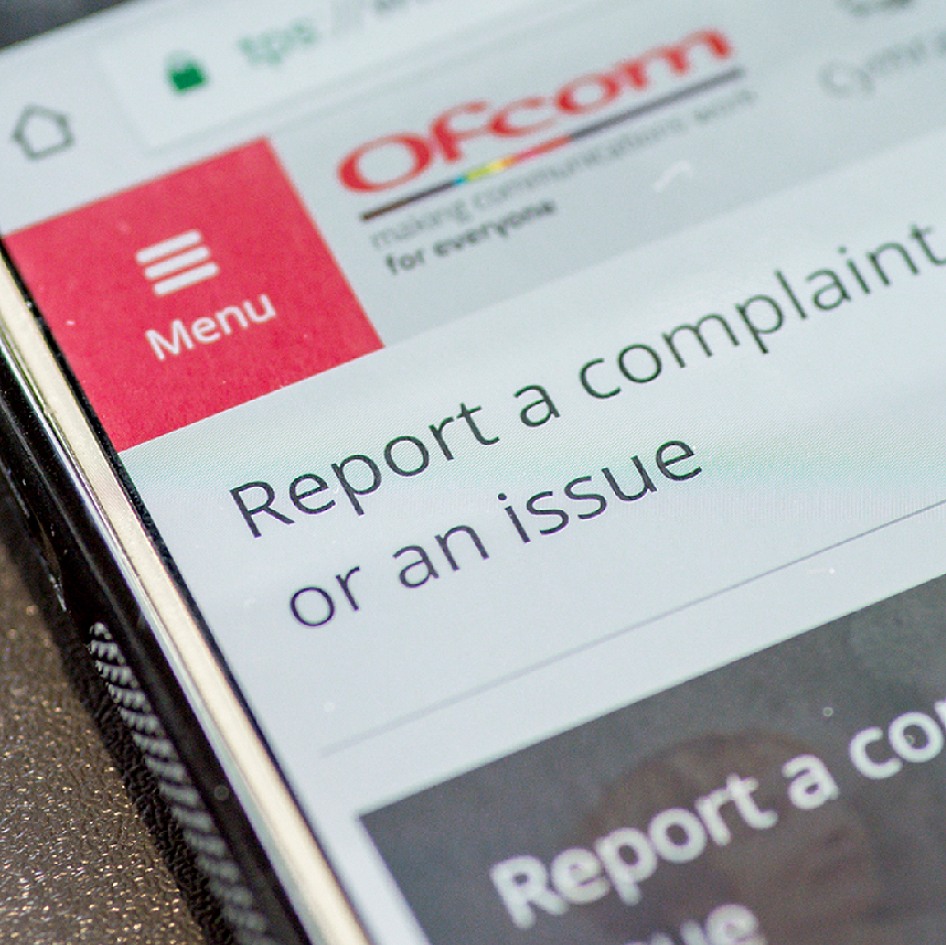

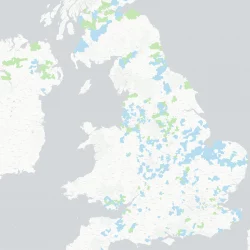














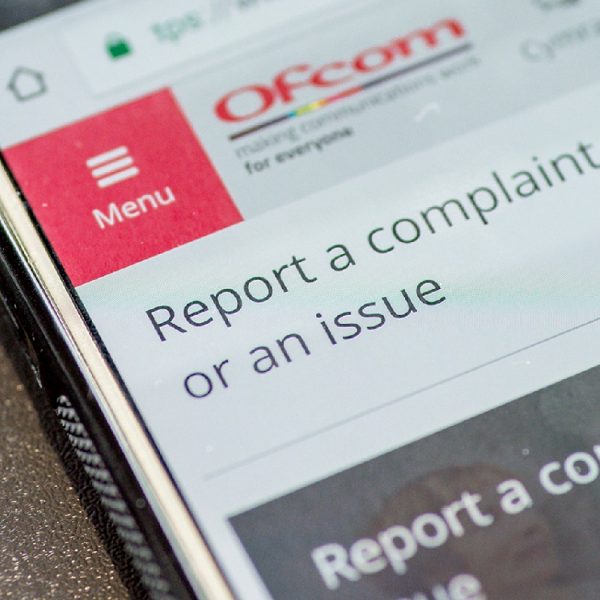

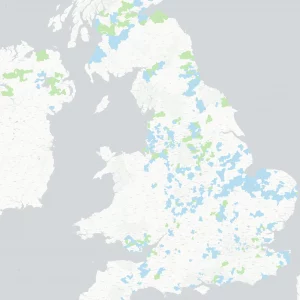



































Comments are closed